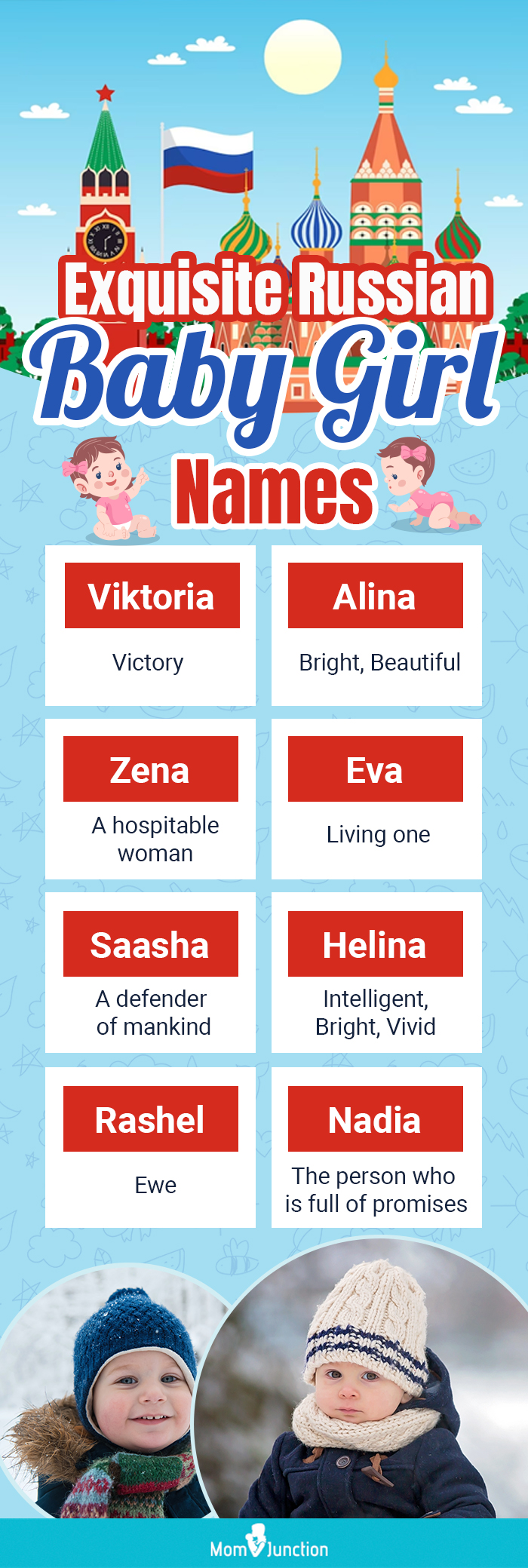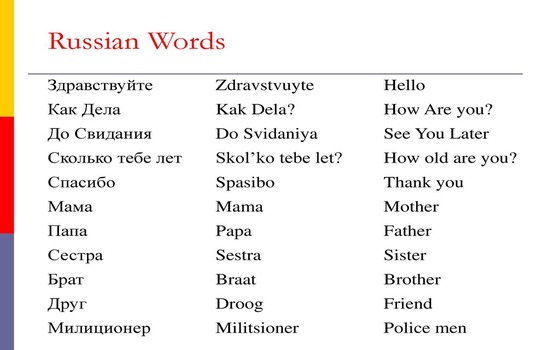What's The Russian Word For Girl? A Look At Key Terms
Have you ever found yourself curious about how other languages talk about everyday things? It's a pretty common thought, especially when you're thinking about learning a new language, or perhaps you just heard someone speak Russian and wondered about a particular word. Well, today, we are going to talk all about how to say "girl" in Russian, and you'll find there's more to it than just one single word, which is rather interesting.
Learning a new language, like Russian, means you get to explore all sorts of neat differences in how people express ideas. It's not always a one-to-one swap for words you know in English, and that's actually what makes it so much fun. When it comes to talking about young females, or "girls," Russian has a few different terms, and each one helps paint a slightly different picture.
We'll walk through the main ways to refer to a girl in Russian, look at what makes each one special, and even check out some examples to help you get a better feel for them. This way, you'll feel much more confident when you hear or use these words yourself. So, let's get into it, shall we?
Table of Contents
- The Main Russian Words for Girl
- Девочка (devochka): The Most Common Term
- Девушка (devushka): More Than Just a Girl
- Девица (devitsa): A Less Common Choice
- Other Russian Terms for Girl or Young Woman
- Why Nuances Matter in Russian
- Frequently Asked Questions About Russian Words for Girl
- Wrapping Up Your Russian Vocabulary Journey
The Main Russian Words for Girl
When you want to talk about a "girl" in Russian, there isn't just one simple word that always fits every situation, you know? It's a bit like how in English, you might say "child," "teenager," or "young woman," depending on who you're talking about. Russian has its own set of words that get used, and they help show different stages of life or even different roles a person might have.
The most common ways to express the idea of "girl" in Russian are through words like `девушка` (devushka) and `девочка` (devochka). These two are probably the ones you'll hear and use the most, and they really are quite important to get a good handle on. We'll explore what each one means and when you might choose one over the other.
Beyond these two, there are other words too, like `молодая женщина` (molodaya zhenshchina), `служанка` (sluzhanka), `невеста` (nevesta), and `возлюбленная` (vozlyublennaya), just to name a few. Each of these also refers to a female, but with a specific context or age group in mind. So, it's not just about a simple translation; it's about picking the right word for the moment, which is actually quite neat.
Девочка (devochka): The Most Common Term
If you're looking for the Russian word that most directly translates to "girl," especially a young female, then `девочка` (devochka) is probably the word you're after. This word usually refers to a female child or, you know, someone who is still quite young, like an adolescent. It's the standard term for a girl who hasn't quite reached adulthood yet, and that's a pretty clear distinction.
The word `девочка` is a feminine noun, as you might expect, and it's used in a pretty straightforward way. For example, if you're talking about a group of children and want to point out the females among them, you'd use `девочка`. It's a word that really captures the idea of a young person who is still growing up, so it's quite useful.
Learning the pronunciation for `девочка` is a good first step. It sounds something like "DYEV-och-ka," with the stress on the first syllable. You can often find audio examples from both male and female speakers to help you get it just right, which is very helpful for any language learner.
How to Use Девочка
Using `девочка` in sentences helps make its meaning much clearer. For instance, you might hear a sentence like, "В наше́й шко́ле де́вочек больше, чем мальчиков." This simply means, "There are more girls than boys in our school," which is a pretty common thing to say. It shows how the word is used for actual school-aged children.
Another example could be, "И ма́льчикам, и де́вочкам нужно учи́ться гото́вить еду в..." This sentence talks about how "Both boys and girls need to learn to cook food in..." and so on. Here, `девочкам` is the dative plural form of `девочка`, showing it applies to multiple girls. It's a pretty basic way to refer to young people, you know?
So, when you think of a child who is female, `девочка` is really the word that comes to mind first. It's quite direct and leaves little room for confusion about the person's age, which is helpful when you're just starting out with Russian.
Девушка (devushka): More Than Just a Girl
Now, let's talk about `девушка` (devushka). This word is also often translated as "girl," but it carries a different feel compared to `девочка`. While `девочка` points to a child, `девушка` usually refers to a young woman, someone who is past childhood but perhaps not yet considered a full "woman" (`женщина`). It's a bit like saying "young lady" or "maiden" in English, you know?
The distinction between `девушка` and `женщина` (zhenshchina) is really important in Russian. These words are not exact translations of "girl" and "woman" from English. They communicate nuances that are pretty important to grasp if you want to speak Russian naturally. A `девушка` is typically an unmarried young woman, often in her teens or twenties, or someone who is still seen as youthful.
This word is one of the top translations for "girl" into Russian, especially when you're talking about someone who is no longer a child but hasn't reached a certain age or life stage, like marriage, where `женщина` might become more fitting. It's a word that suggests a certain vibrancy and youth, which is actually quite nice.
Understanding the Nuances of Девушка
When you're learning Russian, getting a sense of the nuances between words that refer to women and girls is truly essential. Words like `девушка`, `девочка`, `женщина`, `подруга` (female friend), and `подружка` (diminutive, often for a younger or closer female friend) can be a bit confusing for beginners. But once you get the hang of them, it really opens up your ability to express yourself more precisely.
For example, the phrase "She no longer looked like a big girl" might be translated as "Она больше не выглядела как молодая девушка." Here, `молодая девушка` (molodaya devushka) implies a young woman, someone who has grown past being a child. It's about a stage of life, you see.
Another instance could be "In response, the girl hit by two combat planetship," which translates to "В ответ девушка сбивает два боевых." In this case, `девушка` refers to a young woman who is capable of action, not a small child. This really shows how the word is used for someone with agency, you know?
Pronunciation and Usage of Девушка
To say `девушка` (devushka), you'd aim for something like "DYEV-oosh-ka," with the stress again on the first syllable. Just like with `девочка`, you can often find audio examples from both male and female speakers to help you practice and perfect your pronunciation. It's really helpful to hear how native speakers say it.
This word is quite versatile. You can use it to refer to a waitress, a sales assistant, or just a young woman you see on the street. It's a respectful and common way to address or talk about someone who is a young adult female, which is pretty handy in daily conversation.
So, if you're ever wondering how to say "girl" in Russian when you mean a young adult or a young lady, `девушка` is definitely the word you want to use. It's a word that communicates a certain level of maturity beyond childhood, but still conveys youthfulness, you know?
Девица (devitsa): A Less Common Choice
While `девочка` and `девушка` are the most frequently used terms, you might also come across `девица` (devitsa) as a translation for "girl." This word is also a feminine noun and can mean a young female, but it's not as common in everyday modern Russian as the other two. It often has a slightly older, perhaps more traditional or even literary feel to it, which is interesting.
`Девица` can sometimes carry the connotation of a "maiden" or an "unmarried girl," a bit like how the English word "lass" might be used. It's one of the top translations you might find in a dictionary, but you'll hear it less often in casual conversation today. So, it's good to know, but perhaps not your go-to word for every situation, you know?
Understanding `девица` helps you get a fuller picture of the range of words Russian has for "girl." It shows how language can change over time, with some words becoming more or less popular. It's a word that adds a little bit of historical flavor to your Russian vocabulary, which is quite neat.
Other Russian Terms for Girl or Young Woman
Beyond the primary words like `девочка` and `девушка`, the Russian language has a whole range of terms that can refer to a "girl" or a young woman, depending on the specific context or role. These words often describe a particular job, relationship, or situation, and they really show how rich the language is. It's not just about age, but about what someone does, or who they are to others, you know?
For instance, the list of Russian words for "girl" can include terms like `молодая женщина` (molodaya zhenshchina), `служанка` (sluzhanka), `невеста` (nevesta), `возлюбленная` (vozlyublennaya), `хористка` (khoristka), `прислуга` (prislyuga), `танцовщица в ревю` (tantsovshchitsa v revyu), and `продавщица` (prodavshchitsa). Each of these points to a female, but with a more specific meaning.
While these aren't direct translations of "girl" in the sense of a young female child, they are often used to describe a female who might be considered a "girl" in a broader, more descriptive way, or a young woman. It's about the role she plays, which is pretty interesting.
Молодая женщина (molodaya zhenshchina)
This phrase literally means "young woman." While `женщина` itself means "woman," adding `молодая` (young) makes it refer to someone who is still in her younger adult years. It's a way to describe someone who is past the `девушка` stage but not yet considered older, you know? It's a pretty clear way to talk about someone who is youthful but an adult.
Служанка (sluzhanka)
This word translates to "maid" or "female servant." Historically, young girls or women often took on such roles, so this word could refer to a "girl" in that specific context. It describes a job, which is a bit different from just saying "girl," but it's a female in a particular role.
Невеста (nevesta)
This means "bride" or "fiancée." A bride is, of course, a female, and often a young woman, so this word is included in the broader list of terms that describe a "girl" in a specific life event. It's a very particular kind of "girl" or young woman, you know?
Возлюбленная (vozlyublennaya)
This word means "beloved" or "sweetheart," referring to a female. It's a term of endearment for a romantic partner, who is often a young woman. So, while not directly "girl," it describes a young female in a loving relationship. It's a rather affectionate term, you see.
Хористка (khoristka)
This translates to "chorister" or "choir girl." It describes a female who sings in a choir. Often, these are young women or girls, so the term specifies their role within a group. It's a word

396 Unique And Popular Russian Names For Girls With Meanings

Girls names. Russian baby girl names | Nomi, Scrittura creativa, Scrittura

Russian Words And Pronunciation